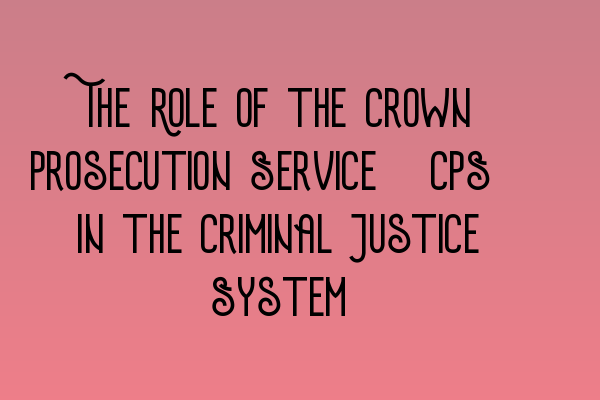The Role of the Crown Prosecution Service (CPS) in the Criminal Justice System
Welcome to the SQE Criminal Law & Practice Blog. Today, we will be discussing the crucial role played by the Crown Prosecution Service (CPS) in the criminal justice system. The CPS is an essential part of the process that ensures the fair and effective prosecution of criminal cases in the UK.
What is the Crown Prosecution Service?
The Crown Prosecution Service, or CPS, is an independent prosecuting authority in England and Wales. Its primary role is to examine the evidence gathered by the police and other law enforcement agencies and make informed decisions about whether criminal charges should be brought against individuals accused of committing offences. The CPS operates on the principle of fairness, ensuring that all decision-making is objective, consistent, and free from any external influence.
If you are preparing for the SQE 1 exam, it is vital to have a deep understanding of the CPS’s role in the criminal justice system. For practice exam questions, check out our SQE 1 Practice Exam Questions article.
Functions of the Crown Prosecution Service
The CPS performs a range of essential functions that contribute to the effective administration of justice. These functions include:
- Reviewing Cases: The CPS reviews evidence gathered by the police to assess whether there is enough evidence to bring charges against an individual.
- Prosecuting Cases: Once the CPS decides there is sufficient evidence, it takes responsibility for prosecuting the case in court. It works closely with various stakeholders, including police officers, witnesses, and experts, to ensure a fair trial.
- Case Preparation: The CPS assists in the preparation of cases by providing legal advice to the police and guiding them on matters of evidence and procedure.
- Court Advocacy: Crown prosecutors represent the CPS in courtrooms, presenting the evidence, examining witnesses, and arguing the case on behalf of the prosecution.
- Supporting Victims and Witnesses: The CPS ensures adequate support for victims and witnesses throughout the criminal justice process, particularly in cases where vulnerable individuals are involved.
If you are looking for SQE 1 preparation courses to enhance your understanding of criminal law and practice, take a look at our SQE 1 Preparation Courses article.
The Role in the Criminal Justice System
The CPS plays a vital role in upholding the rule of law and ensuring justice is served. By reviewing evidence impartially, the CPS ensures that only cases with a realistic prospect of conviction proceed to court. This helps prevent the unnecessary burdening of the court system with weak cases.
Moreover, the CPS operates under the Code for Crown Prosecutors, which sets out clear and consistent guidelines for prosecutors to follow. This ensures transparency and fairness in decision-making processes.
If you are interested in preparing for the SQE 2 exam, we offer comprehensive SQE 2 Preparation Courses to help you master the practical skills required for a successful legal career.
CPS and the Public Interest
The CPS must always act in the public interest when making decisions about which cases to prosecute. The public interest is determined by factors such as the nature and seriousness of the offence, the impact on the community, and the welfare of victims and witnesses.
The CPS carefully balances the rights of defendants with the wider societal considerations, ensuring that justice prevails while safeguarding the well-being of all those involved.
Conclusion
The Crown Prosecution Service plays a vital role in the criminal justice system. By carefully reviewing cases, preparing evidence, and representing the prosecution in court, the CPS ensures the fair and effective prosecution of criminal offences in England and Wales.
If you are interested in the upcoming SRA SQE exam dates, visit our SRA SQE Exam Dates article for more information.
